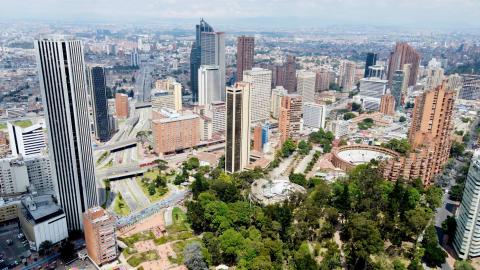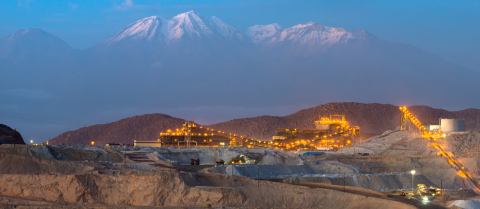
US Leadership for Energy Security? The Case of Equatorial Guinea
Friday May 21, 2010 12:30-2:00pm
Alfredo Okenve Ndo
Co-Founder and Secretary-General of the Centro de Estudios e Iniciativas para el Desarrollo; Representative on the National Commission Extractive Industries Transparency Initiative
Simon Taylor
Founding Director, Global Witness – International NGO co-nominated for the Nobel Peace Prize for work on conflict diamonds, founding member of Publish What You Pay coalition and EITI
Bennett Freeman
Senior Vice President, Sustainability Research and Policy, Calvert Asset Management
Board Member Equatorial Guinea Justice
Moderator – Isabel Munilla
Director, Publish What You Pay United States
School of Advanced International Studies (SAIS)
Johns Hopkins University
Rome Building Auditorium
1619 Massachusetts Ave., NW, Washington, D.C.
Metro: Farragut North or Dupont Circle
Space is limited, please RSVP here by Wednesday May 19.
The panel discussion will highlight gaps in existing oil sector transparency efforts, and explore why U.S. government action, and in particular, transparency legislation introduced in the Senate (the Energy Security Through Transparency Act – S.1700) is a critical contribution to addressing corruption and improving the lives of the citizens of Equatorial Guinea.
The African nation of Equatorial Guinea is of critical strategic importance to the United States. Nestled in the Gulf of Guinea, the majority of its oil production comes to the U.S., and it is the third largest oil supplier to the U.S. from Africa, after Nigeria and Angola. U.S. companies dominate production there, and as a result, it is currently the fourth largest destination for overall US investment in sub-Saharan Africa. The recent oil boom has led to massive windfalls for the country, with government oil revenues going from $190 million in 1993 to $4.8 billion in 2007.
With a population of 650,000, Equatorial Guinea’s GDP per capita is on par with that of Italy and Spain. However, according to government figures, over 75% of the population lives in poverty. This is the result of rampant corruption at the highest levels. For example, oil money laundering by government elites into the U.S. has been under investigation by the U.S Congress for the past several years and was highlighted at a February 2010 hearing of the Senate Permanent Subcommittee on Investigations. Corruption has also fueled human rights abuses and led to official neglect of the government’s obligations to uphold their citizen’s social and economic rights. The government is extremely opaque, and stifles freedoms of information and association, making it nearly impossible for civil society to hold the government accountable for how it manages the country’s energy resources. While Equatorial Guinea joined the voluntary Extractive Industries Transparency Initiative (EITI), it was recently de-listed for not complying with the initiative’s requirements. Given the prominence of the U.S. role in Equatorial Guinea’s oil sector, it is critical that the U.S. government show leadership to help stem corruption.
About the speakers:
Alfredo Okenve Ndoho is the co-founder and secretary-general of the Centro de Estudios e Iniciativas para el Desarrollo, a research and development NGO. He is a member of the Board of Directors of the University of Technical Engineering in Bata and is a civil society representative in Equatorial Guinea's National Commission for the Extractives Industry Transparency Initiative.
Simon Taylor is a director of Global Witness and co-founded the organisation in 1993. He took part in Global Witness’ first investigations into the Thai-Khmer Rouge timber trade in 1995 and carried out Global Witness’ first investigations into corruption in the oil sector in Angola. He co-founded the Publish What You Pay Campaign (PWYP) with George Soros in 2002. PWYP is a global civil society coalition that helps citizens of resource-rich developing countries hold their governments accountable for the management of revenues from the oil, gas and mining industries. Mr. Taylor leads Global Witness’ work on combating corruption in the oil, gas and mining sector and on energy security and climate change. Global Witness was jointly nominated for the Nobel Peace Prize for its work on conflict diamonds, which led to the establishment of the Kimberley Process Certification Scheme, and co-founded the Publish What You Pay Coalition, which in turn led to the creation of the Extractive Industries Transparency Initiative. Mr. Taylor and the other co-founders of Global Witness received the 2005 Gleitsman International Activist Award and in 2007 Global Witness won the Center for Global Development/ Foreign Policy Magazine Commitment to Development Award.
Bennett Freeman manages Calvert's Sustainability Research Department and oversees its company research and analysis as well as its policy and advocacy work. From 2003 until early 2006, he led Burson-Marsteller's Global Corporate Responsibility practice advising multinationals on policy development, stakeholder engagement and communications strategies related to human rights, labor rights and sustainable development. During the Clinton Administration he served in three positions as a political appointee in the State Department, most recently as Deputy Assistant Secretary for Democracy, Human Rights and Labor from 1999 to early 2001. In that capacity, he led the development of the Voluntary Principles on Security and Human Rights, the first human rights standard forged by governments, companies and NGOs for the extractive sectors. Earlier in his career he was Manager-Corporate Affairs for General Electric and a presidential campaign aide to former Vice President Walter Mondale. Mr. Freeman currently serves on the Boards of Oxfam America, Equatorial Guinea Justice, Extractive Industry Transparency Initiative (EITI) representing Oxfam and the Revenue Watch Institute, as well as the Steering Committee of Amnesty International USA's Business and Human Rights program. He received an MA in Modern History from the University of Oxford and an AB in History from the University of California at Berkeley.
Contenido relacionado





